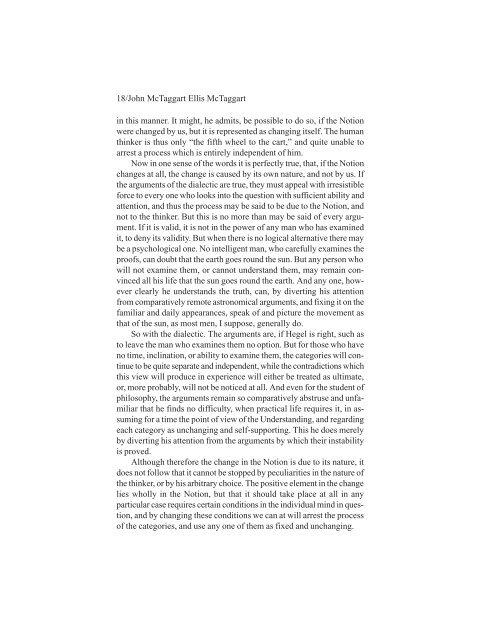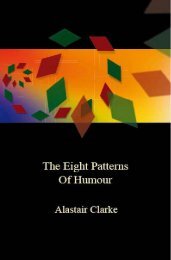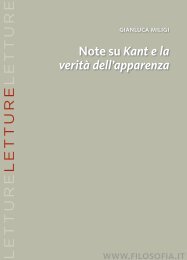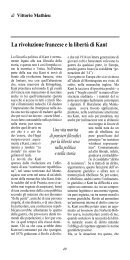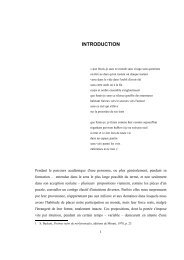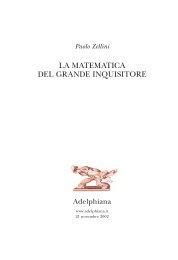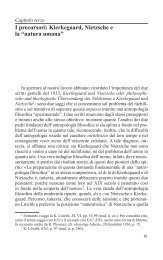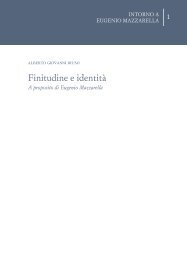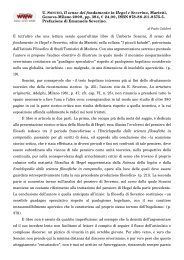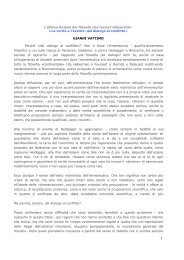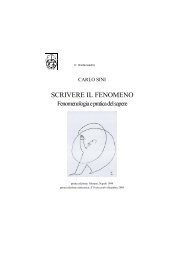McTaggart, Studies in the Hegelian Dialectic
McTaggart, Studies in the Hegelian Dialectic
McTaggart, Studies in the Hegelian Dialectic
You also want an ePaper? Increase the reach of your titles
YUMPU automatically turns print PDFs into web optimized ePapers that Google loves.
18/John <strong>McTaggart</strong> Ellis <strong>McTaggart</strong><br />
<strong>in</strong> this manner. It might, he admits, be possible to do so, if <strong>the</strong> Notion<br />
were changed by us, but it is represented as chang<strong>in</strong>g itself. The human<br />
th<strong>in</strong>ker is thus only “<strong>the</strong> fifth wheel to <strong>the</strong> cart,” and quite unable to<br />
arrest a process which is entirely <strong>in</strong>dependent of him.<br />
Now <strong>in</strong> one sense of <strong>the</strong> words it is perfectly true, that, if <strong>the</strong> Notion<br />
changes at all, <strong>the</strong> change is caused by its own nature, and not by us. If<br />
<strong>the</strong> arguments of <strong>the</strong> dialectic are true, <strong>the</strong>y must appeal with irresistible<br />
force to every one who looks <strong>in</strong>to <strong>the</strong> question with sufficient ability and<br />
attention, and thus <strong>the</strong> process may be said to be due to <strong>the</strong> Notion, and<br />
not to <strong>the</strong> th<strong>in</strong>ker. But this is no more than may be said of every argument.<br />
If it is valid, it is not <strong>in</strong> <strong>the</strong> power of any man who has exam<strong>in</strong>ed<br />
it, to deny its validity. But when <strong>the</strong>re is no logical alternative <strong>the</strong>re may<br />
be a psychological one. No <strong>in</strong>telligent man, who carefully exam<strong>in</strong>es <strong>the</strong><br />
proofs, can doubt that <strong>the</strong> earth goes round <strong>the</strong> sun. But any person who<br />
will not exam<strong>in</strong>e <strong>the</strong>m, or cannot understand <strong>the</strong>m, may rema<strong>in</strong> conv<strong>in</strong>ced<br />
all his life that <strong>the</strong> sun goes round <strong>the</strong> earth. And any one, however<br />
clearly he understands <strong>the</strong> truth, can, by divert<strong>in</strong>g his attention<br />
from comparatively remote astronomical arguments, and fix<strong>in</strong>g it on <strong>the</strong><br />
familiar and daily appearances, speak of and picture <strong>the</strong> movement as<br />
that of <strong>the</strong> sun, as most men, I suppose, generally do.<br />
So with <strong>the</strong> dialectic. The arguments are, if Hegel is right, such as<br />
to leave <strong>the</strong> man who exam<strong>in</strong>es <strong>the</strong>m no option. But for those who have<br />
no time, <strong>in</strong>cl<strong>in</strong>ation, or ability to exam<strong>in</strong>e <strong>the</strong>m, <strong>the</strong> categories will cont<strong>in</strong>ue<br />
to be quite separate and <strong>in</strong>dependent, while <strong>the</strong> contradictions which<br />
this view will produce <strong>in</strong> experience will ei<strong>the</strong>r be treated as ultimate,<br />
or, more probably, will not be noticed at all. And even for <strong>the</strong> student of<br />
philosophy, <strong>the</strong> arguments rema<strong>in</strong> so comparatively abstruse and unfamiliar<br />
that he f<strong>in</strong>ds no difficulty, when practical life requires it, <strong>in</strong> assum<strong>in</strong>g<br />
for a time <strong>the</strong> po<strong>in</strong>t of view of <strong>the</strong> Understand<strong>in</strong>g, and regard<strong>in</strong>g<br />
each category as unchang<strong>in</strong>g and self-support<strong>in</strong>g. This he does merely<br />
by divert<strong>in</strong>g his attention from <strong>the</strong> arguments by which <strong>the</strong>ir <strong>in</strong>stability<br />
is proved.<br />
Although <strong>the</strong>refore <strong>the</strong> change <strong>in</strong> <strong>the</strong> Notion is due to its nature, it<br />
does not follow that it cannot be stopped by peculiarities <strong>in</strong> <strong>the</strong> nature of<br />
<strong>the</strong> th<strong>in</strong>ker, or by his arbitrary choice. The positive element <strong>in</strong> <strong>the</strong> change<br />
lies wholly <strong>in</strong> <strong>the</strong> Notion, but that it should take place at all <strong>in</strong> any<br />
particular case requires certa<strong>in</strong> conditions <strong>in</strong> <strong>the</strong> <strong>in</strong>dividual m<strong>in</strong>d <strong>in</strong> question,<br />
and by chang<strong>in</strong>g <strong>the</strong>se conditions we can at will arrest <strong>the</strong> process<br />
of <strong>the</strong> categories, and use any one of <strong>the</strong>m as fixed and unchang<strong>in</strong>g.


